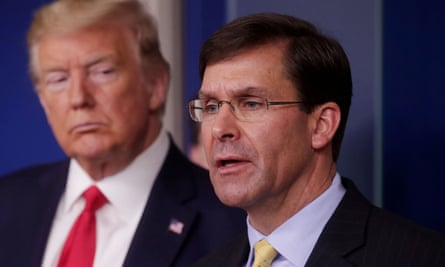Extract from The Guardian
Fears that appointment of extreme Republican partisans could endanger or politicise operation of defense department.

First published on Wed 11 Nov 2020 22.05 AEDT
Extreme Republican partisans have been installed in important roles in the Pentagon, following the summary dismissal of the defense secretary, Mark Esper, at a time Donald Trump is refusing to accept his election defeat.
Democrats immediately demanded explanations for the eleventh-hour personnel changes and warned that the US was entering dangerous “uncharted territory” with the reshuffling of key national security roles during a presidential transition.
However defence experts argued there was little the new Trump appointees could do to use their positions to the president’s advantage, given the firm refusal of the uniformed armed services to get involved in domestic politics.
Anthony Tata – a retired army brigadier general, novelist and Fox News commentator who called Barack Obama a “terrorist leader” – has taken control of the Pentagon’s policy department, following the resignation of the acting undersecretary of defence for policy, James Anderson.
Tata had been unable to win Senate confirmation after old tweets surfaced in which he expressed virulent Islamophobic views.
According to Axios, another new Miller adviser is Douglas Macgregor, a retired army colonel who was nominated over the summer, but not confirmed, as ambassador to Germany. Macgregor has referred to immigrants to Europe as “Muslim invaders”, advocated shooting illegal immigrants on the US border, and promoted a range of white nationalists conspiracy theories. He advocated a fast withdrawal from Afghanistan and has said the US should not “rush hundreds of thousands of troops to the Polish border to deal with the Russians”.
The undersecretary of defence for intelligence, Vice Admiral Joseph Kernan, a retired navy Seal, was also reported to have resigned on Tuesday, and was replaced by Ezra Cohen-Watnick, a former aide to Michael Flynn, Trump’s first national security adviser who pleaded guilty to perjury.
The next 70 days will be precarious at best and downright dangerous at worst
Lisa Gordon-Hagerty, head of the National Nuclear Security Administration, which oversees the nation’s stockpile of nuclear warheads, was forced to quit on Friday.
The fate of CIA director, Gina Haspel, was also in question. In a show of support, Senate majority leader, Mitch McConnell invited Haspel to his office on Tuesday and Republican Senator John Cornyn tweeted: “Intelligence should not be partisan”. But he was attacked on Twitter by the president’s son, Donald Trump Jr, who asked if he or other Republicans backing Haspel had “actually discussed this with anyone in the Admin[istration] who actually works with her … or are you just taking a trained liar’s word for it on everything?”
The reasons for the post-election personnel changes 10 weeks before the end of Donald Trump’s tenure were unclear, but they came at a time when the president is refusing to accept election defeat.
The former defence secretary, Mark Esper, fired by tweet on Monday, had refused to allow active duty troops to be deployed on US streets during the Black Lives Matter protests over the summer.

In his resignation letter, Anderson, the outgoing Pentagon policy chief, also signalled his unease with the direction the Trump White House was taking in the aftermath of the election.
“Now, as ever, our long-term success depends on adhering to the US constitution all public servants swear to support and defend,” he wrote.
Democrats raised the alarm over the wave of staff changes at the Pentagon.
“It is hard to overstate just how dangerous high-level turnover at the department of defence is during a period of presidential transition,” wrote Adam Smith, the chairman of the House armed services committee, adding that the development “should alarm all Americans”.
“If this is the beginning of a trend – the president either firing or forcing out national security professionals in order to replace them with people perceived as more loyal to him – then the next 70 days will be precarious at best and downright dangerous at worst.”
The top Democrat on the Senate intelligence committee, Mark Warner, said the US had entered “uncharted territory” with Esper’s firing.
“There’s never been a time when a senior official like this has been fired during a transition period between one administration to another,” Warner told MSNBC.
Former officials and military analysts argued that the post-election changes, while highly unusual, were not a reason to fear that the Pentagon would be weaponised in Trump’s desperate efforts to hold on to power.
“Remember all the senior military officers are still there,” said Mark Cancian, a retired US marine colonel and former senior defence official. “Their attitudes remain the same. They’ve been quite emphatic that the role of the military is very limited in civilian civil disturbances.”
Eugene Gholz, a former senior adviser in the Pentagon and the author of US Defense Politics: The Origins of Security Policy, agreed: “Among military officers at all ranks it is deeply, deeply ingrained that the military is not used for settling politics.”
Gholz, now associate professor of political science at the University of Notre Dame, suggested one possible, more prosaic, reason for the reshuffle, could be to pad the résumés of partisan officials to help smooth confirmation hearings next time Republicans are in office.
“There’s an opportunity to give someone a credential of a leadership position,” he said. “Now they could at least claim: ‘Hey look, I had this title, even if only briefly, in the Trump administration.’”
No comments:
Post a Comment